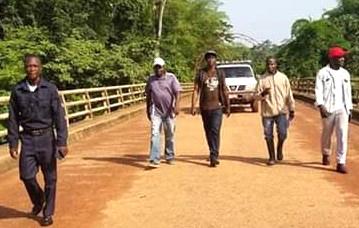Nimba Inspector Wants Communities take Ownership of School Renovation Project

Inspector Mark Gblinwon on tour at Nimba-Grand Gedeh border
As renovation work begins on public schools across Nimba through grants provided by the World Bank, the County Inspector of Nimba, Mark Gblinwon, is urging citizens to take ownership of the work and help the government to ensure that the project is implemented.
Recently, the Ministry of Education and its partners officially held a discussion with school authorities and community leaders on the World Bank grants for school renovation and rehabilitation.
About 24 high schools are expected to benefit from the school renovation and rehabilitation project in Nimba County.
Mr. Gblinwon told the community to provide all protections or safeguard every material for the renovation or rehabilitation of schools in their community.
The County Inspector’s caution drives from the background where contractors sometimes connive with locals to steal materials and sell for personal gains. This practice is very common in the construction industry in Liberia.
Many people undertaking building projects had fallen prey to this clandestine deed that has become typical of builders. Steel rods and cement are two major materials that builders often steal from project owners whenever they are left alone.
This being the government's project creates the corridor for those in charge to steal materials since people do not take much interest in what belongs to the public.
Gblinwon warned that anyone who tampers with any of those materials by stealing or selling them will be dealt with according to the law.
The World Bank provided about US$ 57m to the government for renovation and rehabilitation of public schools, especially secondary schools across Liberia.
In this budget, some public schools will be renovated, while some will be constructed with residential areas for staff as well as other modern facilities.
The inspector was very strict in his warning, urging the citizens not to steal any of the materials on the perception that they belong to the government and not much attention is paid to them in terms of monitoring.
He stressed that if the schools are not properly renovated or rehabilitated, the host community will be the victim, because it is their children who will be the end users.
“Government thing is everybody’s business, not only the President or Superintendent or any local government official, but it is everybody’s responsibility to safeguard government properties to ensure that it is used wisely and for the intended purpose,” said Gblinwon.
The issue regarding the misuse of government property by carelessly handling or sometimes selling them had caused most of the previous donor funded projects to end in failure or be poorly constructed.
In a recent tour of Nimba by the Daily Observer, it was established that most of the public schools or clinics constructed from 2004 to 2010 have somehow collapsed while others are in dilapidated condition due to poor construction that resulted from the sale of materials that were intended for the construction.
The Gblarlay Public School was funded by LACE and implemented by a construction firm known as ‘Do Your Best’, but this project that was completed in 2007 is now in a dilapidated condition and residents say it took less than a year to fall in that condition.
